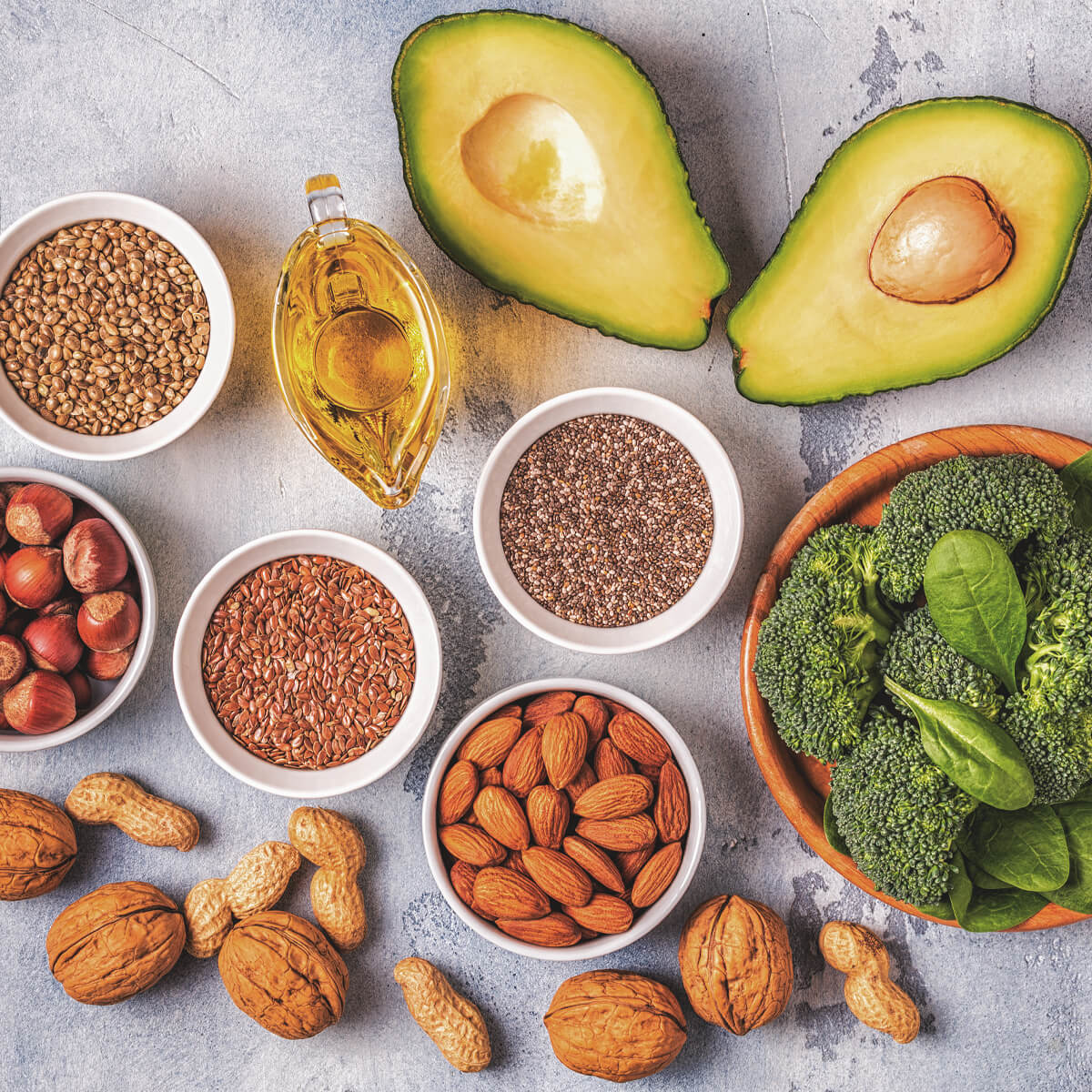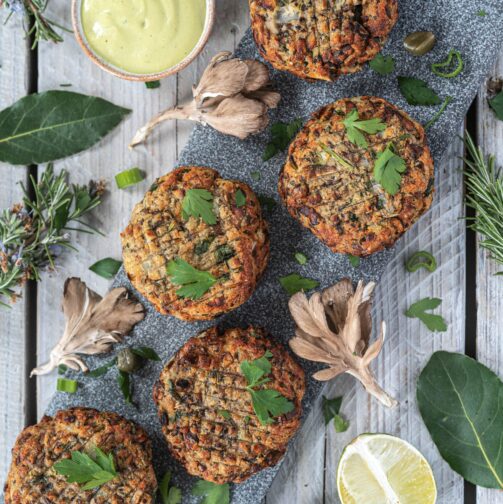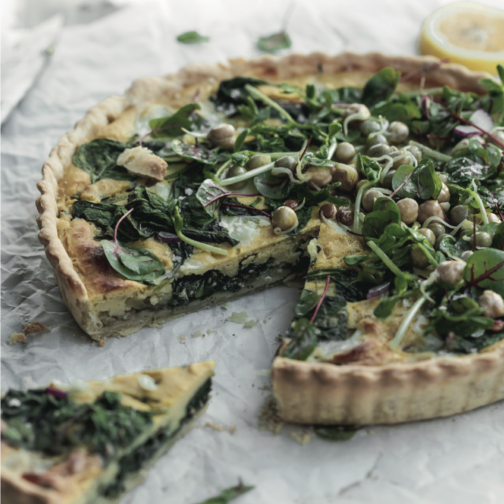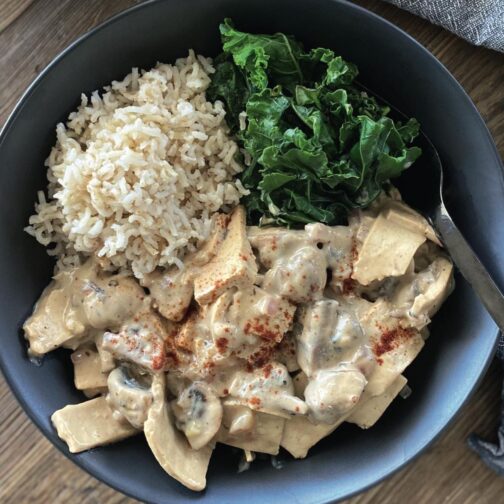
The omega fatty acids are all-important dietary fats, but do plant-based sources provide enough for good health? Here’s what you need to know to ensure optimal levels.
Omega-3 fatty acids are essential for good health, playing an important role in the functioning of our brain and heart. Our bodies cannot produce these fatty acids, which means they must be obtained from our diet. The most well-known sources of omega-3 are oily fish, so does this mean those following a plant-based diet are missing out? Not necessarily. There’s more to the story.
OMEGA-3 FATTY ACIDS
Omega-3 fatty acids are a type of polyunsaturated fat and are considered a healthy fat. The three main types are:
- EPA (eicosapentaenoic acid)
- DHA (docosahexaenoic acid)
- ALA (alpha-linolenic acid)
EPA and DHA are long-chain fatty acids. They are sometimes referred to as ‘marine’ fatty acids because they are mostly found in fish (such as salmon, mackerel, sardines, and anchovies) and in marine algae. These are preformed omega-3s, which are in the active form our bodies can use and are linked to heart health, infant brain development, weight management, and cognitive function. DHA is a component of all cell membranes and plays a role in anti-inflammatory processes. Because vegans don’t directly consume EPA or DHA in the foods they eat, it’s important to either take a marine algae supplement for preformed active EPA and DHA or to consume plenty of plant-based omega-3 fatty acids (ALAs), which the body can convert into the longer, active forms.
ALAs can be obtained from plant sources such as ground flaxseed, walnuts, ground chia seeds, hemp seeds, and Brussels sprouts. ALA is a short-chain fatty acid and must be elongated into the bioactive, long-chain omega-3s (EPA and DHA) for our bodies to successfully use it. This conversion to the usable forms of EPA and DHA is the tricky part, because the process can be negatively affected by too much omega-6 – which we’ll get to shortly. Other factors that can impact conversion rates include nutrient deficiencies, genetics, health status, and gender.
Because the conversion process is complex and, in some people, inefficient, it is a good idea for those following a plant-based diet to include a marine algae supplement to ensure adequate intakes of preformed DHA and EPA.
Fish contain EPA and DHA in their tissues, which they obtain from feeding on the marine microalgae in their natural environment. However, fish can contain extremely high levels of toxic chemical residues in their flesh and fat – as much as 9 million times that of the water in which they live. Mercury and PCBs (polychlorinated biphenyls) are a big concern, and it has been found that consuming even low concentrations of PCBs can cause mental and physical disability in children. Farmed fish are even worse because they have more fat, meaning even more toxins. Therefore, it makes sense to cut out the fish and go straight for an algae supplement.
There are two other essential fatty acids to understand to complete the omega picture.
OMEGA-6 FATTY ACIDS
Omega-6 fatty acids are another type of polyunsaturated fat that we must also obtain from our diet – but not in excessive amounts. Consuming large quantities of omega-6 can impact the absorption rates of the all-important omega-3s. It is believed this occurs because omega-3 and omega-6 fatty acids both require the same enzyme for digestion, so they compete for absorption. The anti-inflammatory properties of the omega-3s you consume may never be used by the body if your omega-6 intake is too high.
There are four types of omega-6 fats:
- Linoleic acid (LA), found in vegetable oils, nuts, and seeds
- Arachidonic Acid (AA), found in the fatty parts of meat and fish
- Gamma linoleic acid (GLA), found in evening primrose oil and borage oil
- Conjugated linoleic acid (CLA), found in animal products and sunflower and safflower oils
LA is a plant-based omega-6 fat that is found in foods like avocados, nuts, seeds, and processed oils. Although LA is the only essential omega-6 fatty acid, some others are classified as conditionally essential, meaning they may become essential if the body has certain developmental diseases or conditions. Omega-6 fatty acids are important for regulating our genes, blood clotting, and immune health, but remember, it is important that we don’t consume too much, as this can affect our uptake of omega-3s.
THE ALL-IMPORTANT RATIO
The ratio of omega-3 to omega-6 fatty acids we consume can influence the conversion rate of the active forms we need. The recommended ratio of omega-6 to omega-3 intake is 4:1; however, studies have indicated the omega-6 to omega-3 ratio people in westernised countries consume is more like 16:1. Diets high in omega-6 fatty acids have been found to reduce the conversion of ALA into DHA and EPA by 40–50 percent. A higher ratio of these fats not only affects the conversion of the omega-3 we need, but also increases the risk for developing chronic diseases.
This does not mean we should cut out all omega-6 sources from our diet – but we should focus on reducing foods that contain processed vegetable and seed oils. Safflower, grapeseed, sunflower, wheat germ, corn, walnut, and cottonseed oils are among the highest in omega-6 fatty acids, so cutting these (and the processed foods that contain them) out of your diet is an effective way to reduce your omega-6 intake. However, some argue that focusing on increasing intakes of EPA and DHA is more important than decreasing our LA omega-6 fatty acids, particularly when it comes to healthy wholefoods, such as avocadoes, nuts, and seeds.
OMEGA-9 FATTY ACIDS
Omega-9 fatty acids are non-essential because they can be made by the body. They are a type of monounsaturated fat and, although produced by the body, can also be beneficial when obtained from food. Food sources of omega-9 include almonds, cashews, olive oil, and avocado oil. Omega-9s may benefit health by helping to lower LDL cholesterol (the bad one) while raising HDL cholesterol (the good). It may also play a role in controlling blood sugar.
GETTING THE BALANCE RIGHT
The World Health Organisation (WHO) and the European Food Safety Authority (EFSA) recommend that we should be getting at least half a percent of our calories from the essential omega-3 fats in the form of ALA. This is equivalent to approximately one tablespoon of chia seeds or ground flax or two tablespoons of hemp seeds daily, with an additional 250 milligrams of preformed DHA/EPA from algae oil. The WHO and the EFSA also recommend an omega-6 fatty acid intake (from LA) of 10 grams per day. This could be one 30-gram serving of walnuts (which contains about 10.8 grams of LA) or of sunflower seeds (which contains about 9.3 grams). The Institute of Medicine recommends no more than five to 10 percent of our total calories should come from omega-6 fatty acids to reduce the risk of heart disease.
If your diet doesn’t include food sources of EPA and DHA (omega-3), or if you choose not to take a supplement, it is recommended that you double your ALA (omega-3) intake to help with more efficient conversion of omega-3 fatty acids into the active form your body needs. To achieve the 4:1 ratio of omega-6 to omega-3 fatty acids, you may need to reduce your LA (omega-6) intake by drastically reducing your intake of fatty foods, fried foods, and packaged foods while also avoiding the use of vegetable oils, particularly those mentioned previously.
Remember, omega-3 (ALA) and omega-6 (LA) fatty acids are considered essential, so must be obtained through our diet. Although EPA and DHA are not technically essential (because ALA can be converted into EPA and DHA), the conversion rate can be low, particularly if you have a high intake of omega-6 fats. Therefore, if you are following a plant-based diet – and especially if you’re pregnant, breastfeeding, or elderly – taking a marine algae supplement is advised.





















